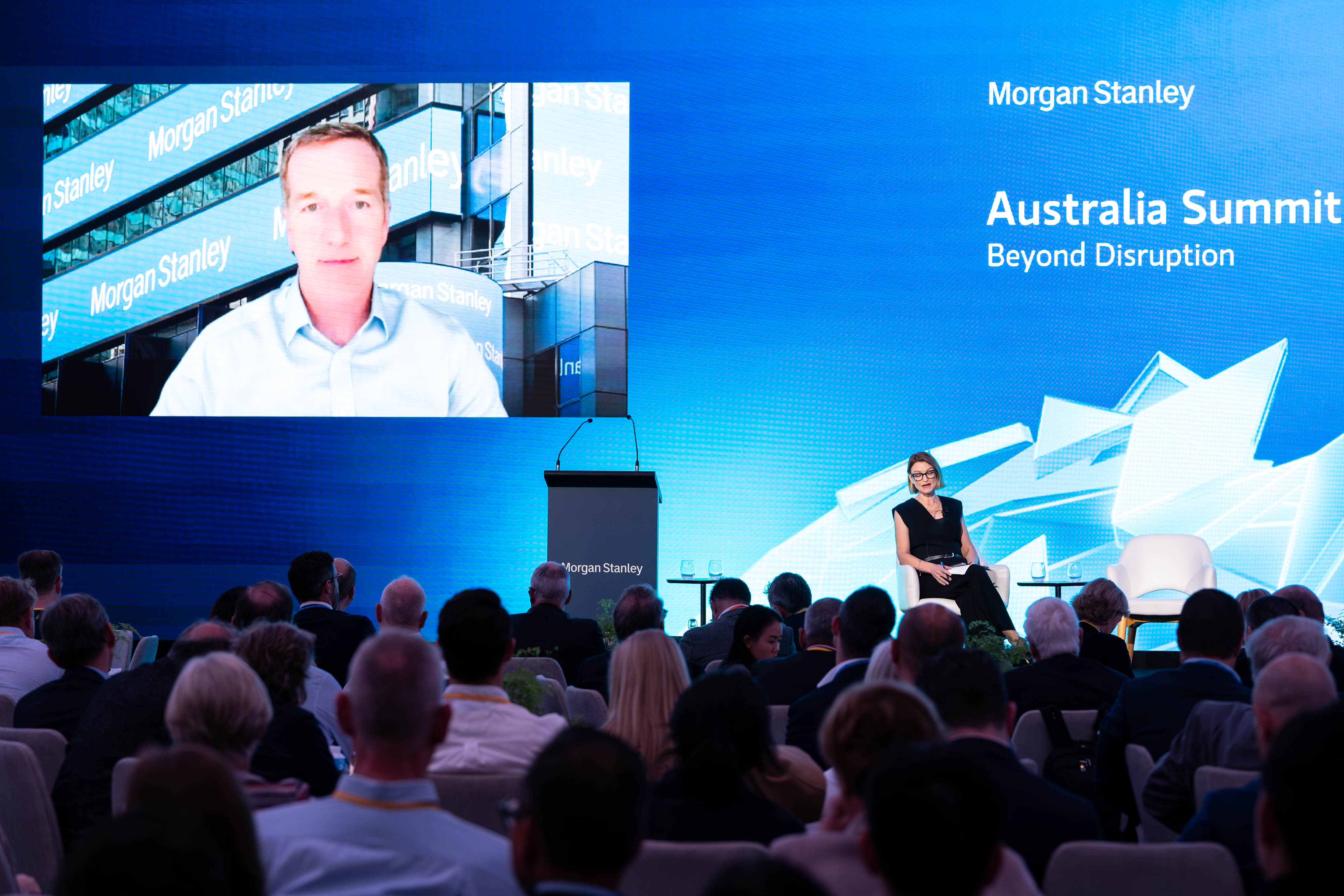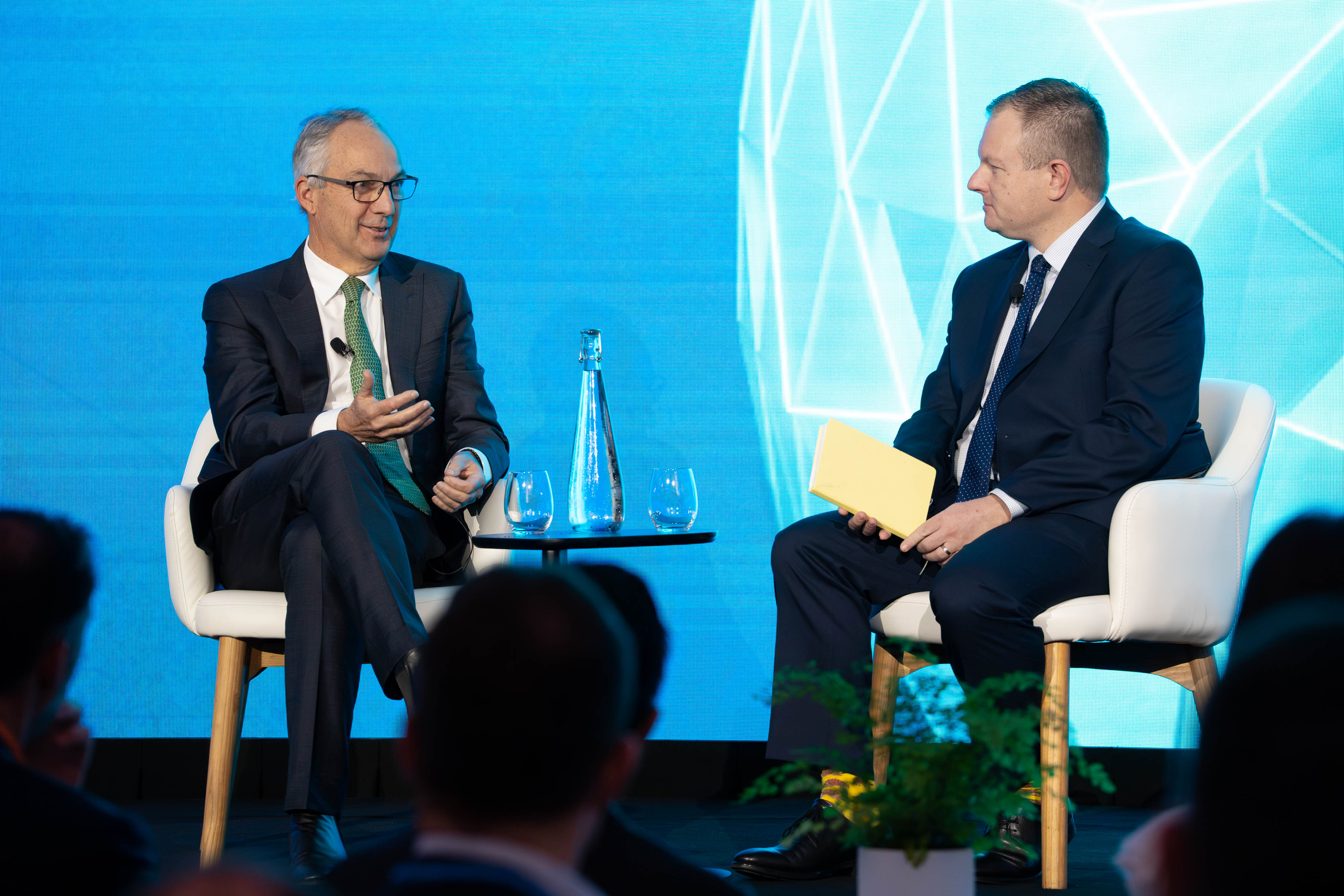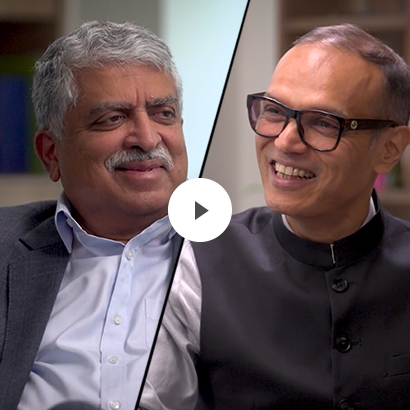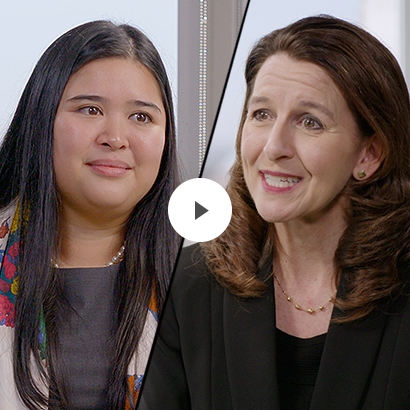On June 7 and 8, Morgan Stanley hosted its highly anticipated 2023 Australia Summit in Sydney. Continuing the theme of Disruption, the annual event brought together some of the world’s most sought-after thought leaders to discuss key disruptive forces shaping the competitive landscape, and trends across major industries.
Morgan Stanley Australia’s annual event featured a number of sessions including keynote presentations and panel discussions from business leaders, investors and Morgan Stanley’s leading global and local research analysts covering a wide range of topics including artificial intelligence, impacts of the high interest rate environment, cybersecurity, geopolitical disruptions, domestic and global investment ideas, and Australia's role in accelerating the energy transition.
The diverse group of speakers were unified by the key topics of artificial intelligence, including how it will disrupt markets and ecosystem, as well as the impacts of inflation on the economy.
Below are some highlights from some of the speakers across the two-day event.
“AI is not going to avert the slowdown we’re going to feel this year”
Mike Wilson, Chief Investment Officer and Chief US Equity Strategist, Morgan Stanley
Mike Wilson’s session on day two, “Where’s the correction we’ve been looking for?”, addressed his views on a new bear market.
“We are either going to be really right, or really wrong. I find this to be a very exciting time. We’ve been waiting for this opportunity patiently for the last year and a half.” he said.
Mike Wilson pointed out the market has become addicted to “guidance from a higher power”, where bond market inverters have become addicted to guidance from the Federal Reserve and stock investors have become addicted to guidance from companies. He believes this trend is dangerous. While investors are feeling better that companies are meeting earnings guidance and their guidance for the second half of the calendar year looks positive, Mike Wilson said they’ve forgotten that company managers are meeting a bar they have themselves lowered over the last 12 months.
Mike Wilson predicted the combination of the US Federal Reserve tightening monetary policy at the same time the US economy is slowing and dealing with a banking crisis, will accelerate an earnings recession that is already underway, pushing stocks lower.
Mike Wilson believes AI is not going prevent the slowdown in markets this year. He thinks that the idea that it’s going to stave off the earnings recession that is already in progress is naive and premature. He pointed out the hype around AI is here now, but the profits are a long way off – and for most companies, whether it’s those making AI tools or those deploying them, AI may mean higher costs rather than higher revenue in the short term.

“Next year, we’re all going to be talking about deflation”
Cathie Wood, Chief Executive Officer and Chief Investment Officer, ARK Invest
Cathie predicts that next year, we’re all going to be talking about deflation. She said a return to a deflationary environment would hurt value stocks, and some mega cap stocks that have squeezed higher this calendar year.
Cathie believes AI is the biggest catalyst to innovation, and sees four characteristics of companies to drive AI success: visionary management, deep domain expertise, broad distribution and proprietary data. She was questioned on not owning Nvidia, and has a counter-consensus view on names such as Google whom she sees as vulnerable to potential disruption.
It would not be a discussion with Cathie without addressing EVs and Tesla – the latter a name on which she remains very bullish. And reflecting on Cathie’s session from 2022, she keeps her high conviction calls on Tech-related healthcare, as well as blockchain and crypto.
“What is considered a luxury today, will be a staple tomorrow”
Zack Kass, Head of Go-To-Market, OpenAI
ChatGPT hit the main-stream this year, being the fastest technology to reach one million users – a whole five days! The challenge is identifying the companies that have the largest opportunities from implementing AI - especially generative AI functions such as Chat GPT – and identify those at most risk.
OpenAI, recently backed by Microsoft, is the developer of the ChatGPT application. Zack Kass, the Go-To-Market Lead at OpenAI, shared that the tech industry itself was surprised with the rapid acceleration in AI technology and development – something set to continue.
Zack predicts in the next three months we’ll see a new ground around 3D vision, video and speech for AI. In the next six to twelve months, we’ll see broader enterprise adoption, and this is when regulatory and compliance challenges may emerge. He specifically called out three industries that will likely see this impact: Financial Services, Professional Services and Education. Zack also sees that in two to three years’ time, we will see real economic impact from AI, leading to job creation, at the same time as deterioration across several industries.

“A soft landing is more likely than not”
Nicholas Moore, Former CEO, Macquarie
Nicholas Moore expects Australia’s economy to have a soft landing post the Reserve Bank of Australia’s pace of interest rate increases. He explained that Australia is dealing with record high inflation and that it may be stickier compared to other economies around the world. Some of the themes on which he touched were the high level of cash in people’s bank accounts from the stimulus, and the issue in Australia around housing affordability.
He highlighted Australia’s housing situation is derived from a supply issue, caused by a shortage of approvals to build. He noted over the last 12 months, we had 400,000 people migrating into the country, and we are not building enough housing to keep pace with demand.
“It’s up to the Federal Government of course through Local Governments, and State Governments, but it’s a massive issue in terms of our society. Fewer people can own their houses today than 20 to 30 years ago,” he said. “Rent is a real question in terms of affordability.”

“High inflation is corrosive and damages our economy”
Philip Lowe, Governor, Reserve Bank of Australia
Philip Lowe began by stating the RBA Board is navigating a narrow path to achieve the return of inflation to its target range, while maintaining economic growth and preserving gains in the labour market. He explained as Australia’s Central Bank, their job is to make sure this period of high inflation, caused by factors like the pandemic-related disruptions, geopolitical events and policy responses, is temporary.
“High inflation is corrosive and damages our economy. It erodes the value of money and savings, puts pressure on household budgets, makes it harder for businesses to plan and distorts investment.” Philip Lowe said. “If inflation stays high for too long, it will become ingrained in people’s expectations and high inflation will then be self-perpetuating. As the historical experiences shows, the inevitable result of this would be even higher interest rates and, at some point, a larger increase in unemployment to get rid of the ingrained inflation. The Board’s priority is to do what it can to avoid this.”
Global economic developments, household spending, growth in unit labour costs and inflation expectations are key factors influencing the Board’s decisions. Further tightening of monetary policy may be required, depending on how the economy and inflation evolve. Despite the risks, the Board remains committed to returning inflation to target and will continue to closely monitor global and domestic economic developments.

“We want to pick the right neighbourhood, not just the house”
Jon Gray, Chief Operating Officer, Blackstone
Blackstone President and Chief Operating Officer Jon Gray and Tim Church, Chairman of Morgan Stanley’s Investment Banking Division, held an interesting and wide-ranging discussion on several trends that inform the way Blackstone manages its US$990b in FUM, and deploys its US$193 billion of dry powder.
Jon noted that inflation is reducing more quickly in the US than other developed economies (including Australia) – a positive sign for the future. Having said that, he still believes the Fed will keep rates elevated, perhaps longer than the market is implying, as they deal with factors such as labour market resilience. Importantly, now is not 2008/9.
He noted Private Credit as currently providing very attractive risk/rewards and thematically, Travel & Leisure, Green Energy, Digitisation and Housing Under Supply are areas to which they’re searching for that “right neighbourhood”, and devoting capital. Not surprisingly, the topic of Commercial Office Real Estate was raised with Blackstone remain highly cautious given the cyclical and structural challenges – logistics remaining preferred and a sector in which they own more than US$200b of assets.

For more from Morgan Stanley’s Australia Summit and insights into disruption, speak to your Morgan Stanley financial adviser or representative. Plus, more Ideas from Morgan Stanley's thought leaders.


